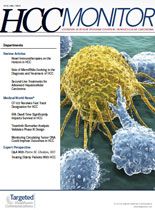Monitoring Circulating Tumor DNA Could Improve Outcomes in HCC
The presence of circulating tumor DNA in serum could predict microscopic vascular invasion of the portal vein and extrahepatic metastasis following surgery for patients with hepatocellular carcinoma.

The presence of circulating tumor DNA in serum could predict microscopic vascular invasion of the portal vein and extrahepatic metastasis following surgery for patients with hepatocellular carcinoma (HCC), according to a study published inCellular and Molecular Gastroenterology and Hepatology (CMGH).
In the analysis, whole-genome sequencing was performed on pre- and post-surgical serum samples from 46 patients who were undergoing HCC resection. Various mutations were detected in all patients, with circulating tumor DNA found in 15.2% of samples. Overall, circulating DNA was associated with a larger tumor size and increased risk of tumor recurrence within 2 years. Moreover, circulating tumor DNA levels were found to increase with disease progression.
"We uncovered that circulating tumor DNA levels accurately reflect cancer progression and therapy effects on hepatocellular carcinoma," said lead study author Atsushi Ono, PhD, from Hiroshima University. "With further research, the identification of genome profiles through circulating tumor DNA analysis may guide individualized management of hepatocellular carcinoma."
In the study, circulating tumor DNA was detected in 100 μL of serum in 7 of the 46 patients before surgery. When compared with the negative group, those with detectable circulating tumor DNA had a statistically significant increase in the cumulative incidence of recurrence (P= .0102) and extrahepatic metastasis (P= .0386). In a multivariate analysis, circulating tumor DNA was found to be an independent predictor of microscopic vascular invasion of the portal vein (odd ratios, 6.10; 95% CI, 1.11-33.33;P= .038).
"Circulating tumor DNA analysis represents a potential paradigm shift in personalized medicine for liver cancer," Jerrold R. Turner, MD, PhD, editor-in-chief,CMGH, said in a statement. "We look forward to seeing future research build on this encouraging data to ultimately improve the effectiveness of therapy against advanced hepatocellular carcinoma."
References
- Ono A, Fujimoto A, Yamamoto Y, et al. Circulating Tumor DNA Analysis for Liver Cancers and Its Usefulness as a Liquid Biopsy, Summary.Cellular and Molecular Gastroenterology and Hepatology.2015;1(5):516-534.

Survivorship Care Promotes Evidence-Based Approaches for Quality of Life and Beyond
March 21st 2025Frank J. Penedo, PhD, explains the challenges of survivorship care for patients with cancer and how he implements programs to support patients’ emotional, physical, and practical needs.
Read More